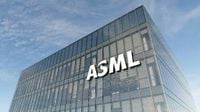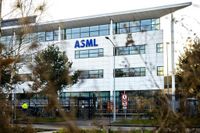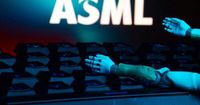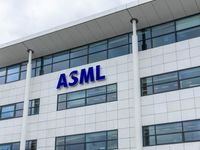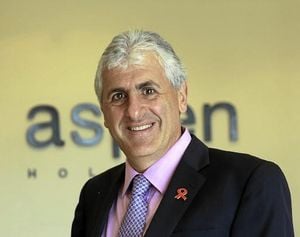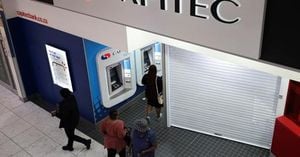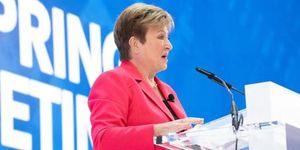On April 16, 2025, ASML, the Dutch chip machine manufacturer, announced that it is grappling with uncertainty surrounding American import duties but is maintaining its revenue forecast for 2025. The company still anticipates achieving a revenue between 30 to 35 billion euros this year. This announcement comes on the heels of ASML reporting a net turnover of 7.7 billion euros for the first quarter of 2025, which aligns with the company's expectations and marks a significant 50 percent increase compared to the previous year.
The gross margin for the quarter was reported at 54 percent, exceeding expectations. ASML's net profit for the first quarter reached nearly 2.4 billion euros, bolstered by the delivery of its fifth high-NA EUV system. However, it was noted that new orders received during this period fell short of initial projections, with the company booking 3.9 billion euros in orders, lower than analysts had anticipated.
ASML's CEO, Christophe Fouquet, indicated that conversations with clients support the expectation that 2025 and 2026 will be growth years for the company. "The demand for chips, driven by artificial intelligence, remains strong," he stated, although he acknowledged that some clients are benefiting more than others from this trend. This dynamic contributes to both upward potential and downward risks reflected in the revenue forecast for 2025.
Looking ahead, ASML expects a net turnover between 7.2 and 7.7 billion euros for the second quarter of 2025, with a gross margin between 50 and 53 percent. For the full year, the company continues to project a total net turnover of 30 to 35 billion euros, with a gross margin anticipated between 51 and 53 percent.
Despite the positive outlook, Fouquet warned of increased uncertainty due to the ongoing trade war and potential U.S. import duties. He emphasized, "The situation will remain dynamic for some time." The U.S. President, Donald Trump, recently announced import duties, although these do not currently affect the chip sector. However, Trump's administration is reportedly considering separate measures for the chip industry, which could make machines and parts exported from the European Union to the United States more expensive.
ASML is collaborating with other companies in the chip sector to mitigate the potential impacts of these import duties. The executives expressed confidence that the company would continue to grow, driven largely by the high demand for AI chips. "Our growth expectation for 2025 has not changed," stated Fouquet. "However, we are aware that the uncertainty in the macro-economy has increased, and the situation will remain dynamic for the foreseeable future."
In the first quarter of 2025, ASML sold 77 machines, which is seven more than during the same period last year, generating a turnover of 5.7 billion euros from these sales. Additionally, the company reported 2 billion euros in revenue from maintaining and improving previously sold machines, an increase from 1.3 billion euros in the prior year.
Geographically, the revenue from machine sales was distributed with 16 percent coming from the U.S., 27 percent from China, and 40 percent from Taiwan, where ASML's largest customer, TSMC, is located. Notably, ASML is prohibited from selling its most advanced machines to China due to trade restrictions.
ASML's net profit of approximately 2.3 billion euros for the first quarter was nearly double that of the same period in 2024. The company also saw an increase in the number of full-time jobs, with over 2,200 new positions added in the past year, bringing the total to over 43,000 employees. However, the number of temporary workers decreased by nearly 800, down to just under 1,000.
Following the announcement of its quarterly figures, ASML's stock price experienced a decline of nearly 5 percent, likely influenced by a recent ban imposed by the U.S. government on the American chip manufacturer Nvidia, which is now restricted from supplying certain types of chips to Chinese companies. This decision has fueled concerns over potential further restrictions and trade barriers.
Despite these challenges, ASML remains optimistic about its future. In response to the growing demand for AI technology, the company is not deterred by the emergence of new competitors, such as the Chinese AI model DeepSeek, which ASML views as "good news." The executives believe that the demand for chips will continue to drive growth, provided that market conditions remain favorable.
In summary, ASML is navigating a complex landscape marked by uncertainty due to trade tensions and potential import duties, while still projecting significant revenue growth driven by the booming demand for AI chips. As the company adapts to these challenges, its leadership remains confident in the prospects for 2025 and beyond.
